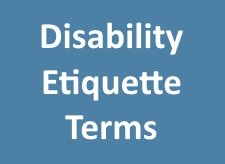Disability Etiquette Glossary
The following disability etiquette terms serve as a guide to more respectfully communicate with people with disabilities in all types of settings.

Acceptable: Disability, a general term used for functional limitation that interferes with a person's ability, for example, to walk, hear or lift. It may refer to a physical, mental or sensory condition.
Unacceptable: Handicap, handicapped person or handicapped.
Acceptable: Person with a disability.
Unacceptable: Cripple, crippled or deformed.
Acceptable: Use a wheelchair or crutches; a wheelchair user; walks with crutches.
Unacceptable: Confined/restricted to a wheelchair; wheelchair bound. Most people who use a wheelchair or mobility devices do not regard them as confining. They are viewed as liberating; a means of getting around.
Acceptable: People with cerebral palsy, people with spinal cord injuries.
Unacceptable: Cerebral palsied, spinal cord injured, etc. Never identify people solely by their disability.
Acceptable: Person who had a spinal cord injury, polio, a stroke, etc. or a person who has multiple sclerosis, muscular dystrophy, arthritis, etc.
Unacceptable: Victim. People with disabilities do not like to be perceived as victims for the rest of their lives, long after any victimization has occurred.
Acceptable: Has a disability, has a condition of (spina bifida, etc.), or born without legs.
Unacceptable: Defective or deformed. These words are dehumanizing, degrading and stigmatizing.
Acceptable: Deafness/hearing impairment. Deafness refers to a person who has a total loss of hearing. Hearing impairment refers to a person who has a partial loss of hearing within a range from slight to severe. Hard of hearing describes a hearing-impaired person who usually has listening and hearing abilities adequate for most communication needs.
Unacceptable: Deaf and dumb is as bad as it sounds. The inability to hear or speak does not indicate intelligence.
Acceptable: Person who has a mental or developmental disability.
Unacceptable: Retarded. Thise term is offensive to individuals.
Acceptable: Able-bodied; able to walk, see, hear, etc.; people who are not disabled.
Unacceptable: Healthy, when used to contrast with "disabled." Healthy implies that the person with a disability is unhealthy. Many people with disabilities have excellent health.
Acceptable: People who do not have a disability.
Unacceptable: Normal. When used as the opposite of disabled, this implies that the person is abnormal. No one wants to be labeled as abnormal.
Acceptable: A person who has (name of disability.) Example: A person who has multiple sclerosis.
Unacceptable: Afflicted with, suffers from. Most people with disabilities do not regard themselves as afflicted or suffering continually.
If you have other suggestions to be added to this information, please send an email by clicking here. Thank you.
Source: Disability etiquette terms by the City of Sacramento, California Access Office. The website is cityofsacramento.org.
Related Information - Disability Etiquette
More on Wheelchair Disability Etiquette
Disability Help and Support Organizations
Popular ArticlesTypes of Mobility Chairs Wheelchair Sports Activities Helpful Resource Organizations Mobility Scooter Buying Tips Portable Ramp Options |


